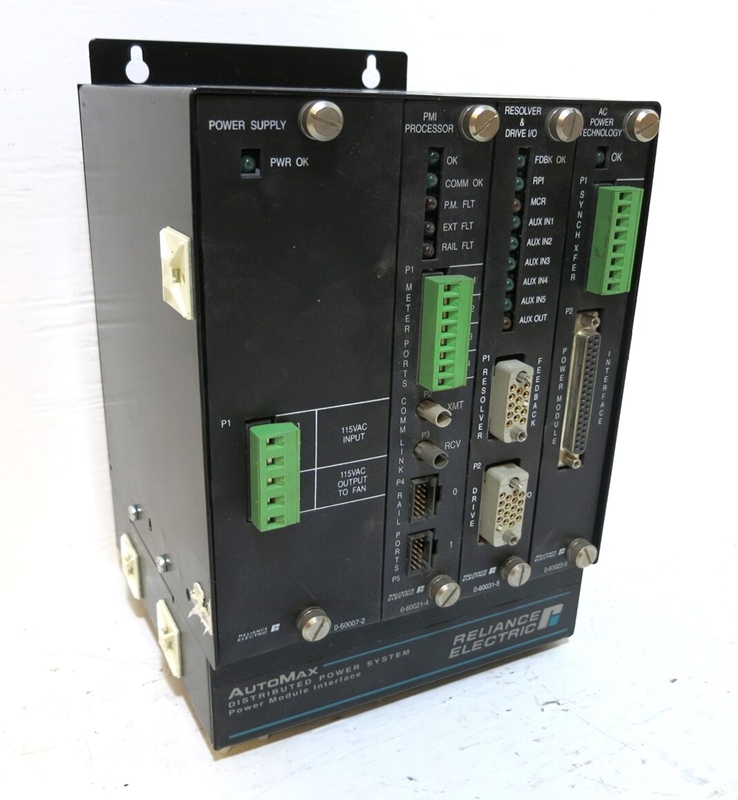Reliance 800123-T analog module
Brand:RELIANCE Model number:800123-T
Country of origin: United States Product weight:0.55kg
HS code:9032899099
Product Details:
Product Dimensions:
A Reliance analog module is an electronic circuit board that plugs into a PLC or control rack's backplane. It processes analog signals, which are continuous values that vary over a range. There are two primary types:
Analog Input Modules: These modules take a continuous analog signal from a field device (like a thermocouple, pressure transmitter, or flow meter) and convert it into a digital value that the controller's central processing unit can understand and process.
Analog Output Modules: These modules do the reverse. They receive a digital value from the controller and convert it into a continuous analog signal (either voltage or current) to drive a field device, such as a variable frequency drive (VFD), a proportional valve, or an analog gauge.
Key features of these modules often include high-resolution conversion (e.g., 12-bit or 16-bit), galvanic isolation to protect the sensitive control electronics from electrical noise and ground loops, and built-in filtering to ensure a clean, accurate signal.
Specific parameters vary by model, but here are some common specifications:
Signal Ranges: Analog modules are designed to handle specific signal ranges, typically:
Voltage: ±1V, ±5V, ±10V, 0-10V.
Current: 4-20mA, 0-20mA. The 4-20mA standard is very popular in industry because a 4mA signal indicates a live circuit (a non-zero value), making it easy to detect a broken wire.
Number of Channels: The number of analog inputs or outputs per module (e.g., 2, 4, 8 channels).
Resolution: This defines the granularity of the signal conversion. A 12-bit module can resolve 4,096 distinct values, while a 16-bit module offers much higher precision with 65,536 values.
Accuracy: Typically expressed as a percentage of the full-scale range (e.g., ±1%).
Conversion Rate: How quickly the module can sample and convert a signal. This is critical for fast-changing processes.
Isolation: The level of electrical isolation between the logic common and the field wiring (e.g., 2500 volts).
Power Dissipation: The amount of power the module consumes during operation.
Physical Dimensions: The size and weight of the module, which must fit into the control rack.
Precision and Accuracy: Analog modules provide a high degree of accuracy and resolution, allowing for fine-tuned control and monitoring of industrial processes.
Robustness: Built to withstand harsh industrial environments, these modules are resistant to temperature fluctuations, humidity, and electrical noise.
Versatility: They can interface with a wide range of analog sensors and actuators, making them adaptable to many different applications.
Electrical Isolation: The isolation feature protects the expensive, sensitive controller electronics from voltage spikes and ground loops originating in the field.
Simplified Troubleshooting: Built-in diagnostics and status LEDs can help technicians quickly identify wiring issues or module failures.
Scalability: The modular design makes it easy to add more analog points to a control system as a process expands, without having to replace the entire controller.
Signal Range Compatibility: It's crucial to select a module whose signal range matches that of your field devices. Using a 0-10V module with a 4-20mA sensor will not work without an external signal converter.
Noise and Filtering: Analog signals are susceptible to electrical noise. Proper shielding and grounding of signal wiring are essential. Many modules include built-in filters that can be configured to minimize interference.
Obsolescence: As Reliance Electric is now a legacy brand, finding new modules can be difficult. Customers may need to rely on surplus markets or third-party suppliers for spare parts and replacements.
Software Configuration: The module's performance, including resolution, filtering, and conversion rates, is often configurable via the controller's programming software. Proper configuration is key to a stable system.
Wiring Practices: Adhere to the manufacturer's wiring diagrams and best practices to ensure signal integrity and safety.
Reliance analog modules are essential for a variety of industrial applications that require precise measurement and control of continuous variables:
Process Control:
Temperature Control: Reading signals from thermocouples and RTDs to regulate a process temperature.
Fluid Control: Measuring flow rates, levels, and pressures to control pumps and valves in chemical plants, refineries, and water treatment facilities.
Machine Automation:
Speed Control: Providing analog signals to VFDs to precisely control the speed of motors in conveyors, fans, and pumps.
Position Control: Driving actuators to control the position of a robotic arm or a damper in an HVAC system.
Energy Management:
Monitoring: Reading power, voltage, and current values from energy meters.
Test and Measurement:
Data Acquisition: Logging sensor data for analysis and quality control in a variety of manufacturing and R&D settings.

We have the same series of models in stock. If you don't find the model you need, please contact us and we will provide you with an official quotation!
RELIANCE ELECTRIC 8000821R
RELIANCE ELECTRIC 57C-435
RELIANCE ELECTRIC 86466-92RC
RELIANCE ELECTRIC 15FR4042
RELIANCE ELECTRIC 800123-T
RELIANCE ELECTRIC 11C83K
RELIANCE ELECTRIC 45C-341
RELIANCE ELECTRIC 20V2160
RELIANCE ELECTRIC 086466060S
RELIANCE ELECTRIC 8646660V
Colour:new Warranty: 12 months
Lead Time:3-day working day Price: Please contact us
Shipping Port: Xiamen, China Payment:T/T
Express cooperation: fedex, DHL, UPS and your express account
Service: Professional Sales provides 24 hours /7 days online service
Our service:

Fast delivery, and can be used with your express account.

Competitive Price

Free Shipping

One-year warranty